| Listing 1 - 10 of 19 | << page >> |
Sort by
|
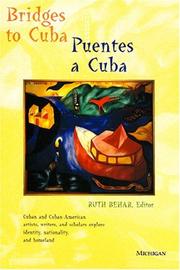
ISBN: 0472066110 Year: 1995 Publisher: Ann Arbor The University of Michigan Press
Abstract | Keywords | Export | Availability | Bookmark
 Loading...
Loading...Choose an application
- Reference Manager
- EndNote
- RefWorks (Direct export to RefWorks)
American literature --- Cuban Americans --- Cuban American authors. --- Literary collections. --- Cuban American authors --- United States --- Relations --- Cuba --- Literary collections --- Cubans --- Civilization
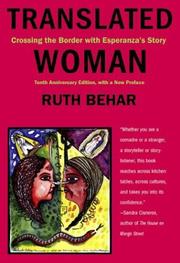
ISBN: 0807046477 Year: 2003 Publisher: Boston, MA : Beacon Press,
Abstract | Keywords | Export | Availability | Bookmark
 Loading...
Loading...Choose an application
- Reference Manager
- EndNote
- RefWorks (Direct export to RefWorks)
Rural women --- Ethnology --- Femmes en milieu rural --- Anthropologie sociale et culturelle --- Social conditions --- Case studies. --- Conditions sociales --- Cas, Etudes de --- Hernãndez, Esperanza. --- Mexquitic (Mexico) --- Mexquitic (Mexique) --- Rural conditions. --- Conditions rurales --- Hernández, Esperanza.
Book
ISBN: 0691094195 Year: 1986 Publisher: Princeton Princeton university press
Abstract | Keywords | Export | Availability | Bookmark
 Loading...
Loading...Choose an application
- Reference Manager
- EndNote
- RefWorks (Direct export to RefWorks)
#SBIB:39A72 --- #SBIB:39A11 --- Etnografie: Europa --- Antropologie : socio-politieke structuren en relaties --- Santa Maria del Monte del Condado (Spain) --- -Rural conditions --- Peasants --- Villages --- Hamlets (Villages) --- Village government --- Cities and towns --- Peasantry --- Agricultural laborers --- Rural population --- Marks (Medieval land tenure) --- Villeinage --- Santa María del Monte del Condado (Spain) --- Santa María del Monte (Vegas del Condado, Spain) --- Santa María del Condado (Spain) --- Rural conditions.
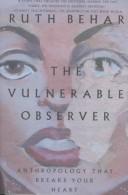
ISBN: 0807046310 Year: 2001 Publisher: Boston (Mass.) : Beacon press,
Abstract | Keywords | Export | Availability | Bookmark
 Loading...
Loading...Choose an application
- Reference Manager
- EndNote
- RefWorks (Direct export to RefWorks)
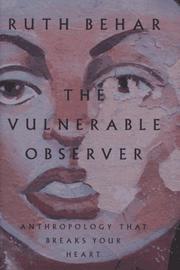
ISBN: 0807046302 Year: 1996 Publisher: Boston : Beacon Press,
Abstract | Keywords | Export | Availability | Bookmark
 Loading...
Loading...Choose an application
- Reference Manager
- EndNote
- RefWorks (Direct export to RefWorks)
Participant observation --- Anthropologists --- Anthropologists --- Observation participante --- Anthropologues --- Anthropologues --- Psychological aspects. --- Attitudes. --- Psychology. --- Aspect psychologique --- Attitudes --- Psychologie
Book
ISBN: 9780822357209 Year: 2013 Publisher: Durham Duke university press
Abstract | Keywords | Export | Availability | Bookmark
 Loading...
Loading...Choose an application
- Reference Manager
- EndNote
- RefWorks (Direct export to RefWorks)
Periodical
Year: 1994 Publisher: Michigan The University of Michigan Press
Abstract | Keywords | Export | Availability | Bookmark
 Loading...
Loading...Choose an application
- Reference Manager
- EndNote
- RefWorks (Direct export to RefWorks)
Book
ISBN: 9781400862399 Year: 2014 Publisher: Princeton, NJ
Abstract | Keywords | Export | Availability | Bookmark
 Loading...
Loading...Choose an application
- Reference Manager
- EndNote
- RefWorks (Direct export to RefWorks)
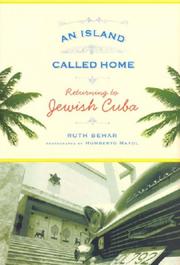
ISBN: 1281224235 9786611224233 081354386X 9780813543864 9781281224231 0813541891 9780813541891 6611224238 Year: 2007 Publisher: New Brunswick, NJ
Abstract | Keywords | Export | Availability | Bookmark
 Loading...
Loading...Choose an application
- Reference Manager
- EndNote
- RefWorks (Direct export to RefWorks)
Yiddish-speaking Jews thought Cuba was supposed to be a mere layover on the journey to the United States when they arrived in the island country in the 1920's. They even called it “Hotel Cuba.” But then the years passed, and the many Jews who came there from Turkey, Poland, and war-torn Europe stayed in Cuba. The beloved island ceased to be a hotel, and Cuba eventually became “home.” But after Fidel Castro came to power in 1959, the majority of the Jews opposed his communist regime and left in a mass exodus. Though they remade their lives in the United States, they mourned the loss of the Jewish community they had built on the island. As a child of five, Ruth Behar was caught up in the Jewish exodus from Cuba. Growing up in the United States, she wondered about the Jews who stayed behind. Who were they and why had they stayed? What traces were left of the Jewish presence, of the cemeteries, synagogues, and Torahs? Who was taking care of this legacy? What Jewish memories had managed to survive the years of revolutionary atheism? An Island Called Home is the story of Behar’s journey back to the island to find answers to these questions. Unlike the exotic image projected by the American media, Behar uncovers a side of Cuban Jews that is poignant and personal. Her moving vignettes of the individuals she meets are coupled with the sensitive photographs of Havana-based photographer Humberto Mayol, who traveled with her. Together, Behar’s poetic and compassionate prose and Mayol’s shadowy and riveting photographs create an unforgettable portrait of a community that many have seen though few have understood. This book is the first to show both the vitality and the heartbreak that lie behind the project of keeping alive the flame of Jewish memory in Cuba. Reader Guide (http://rutgerspress.rutgers.edu/pages/behar_reader_guide.aspx)
Jews, Cuban --- Cuban Americans --- Jews --- Cuban Jews --- Hebrews --- Israelites --- Jewish people --- Jewry --- Judaic people --- Judaists --- Ethnology --- Religious adherents --- Semites --- Judaism --- Behar, Ruth, --- Behar Glinsky, Ruth, --- Glinsky, Ruth Behar, --- Cuba
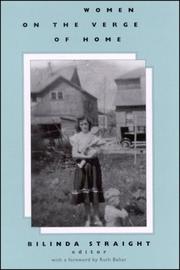
ISBN: 0791463540 Year: 2005 Publisher: Albany State University of New York Press
Abstract | Keywords | Export | Availability | Bookmark
 Loading...
Loading...Choose an application
- Reference Manager
- EndNote
- RefWorks (Direct export to RefWorks)
Developmental psychology --- Psychology --- Sociology of environment --- Demography --- Ethnology. Cultural anthropology --- Identity --- Migration --- Tourism --- Housing --- Book --- Edited volume --- Anthropology
| Listing 1 - 10 of 19 | << page >> |
Sort by
|

 Search
Search Feedback
Feedback About UniCat
About UniCat  Help
Help News
News